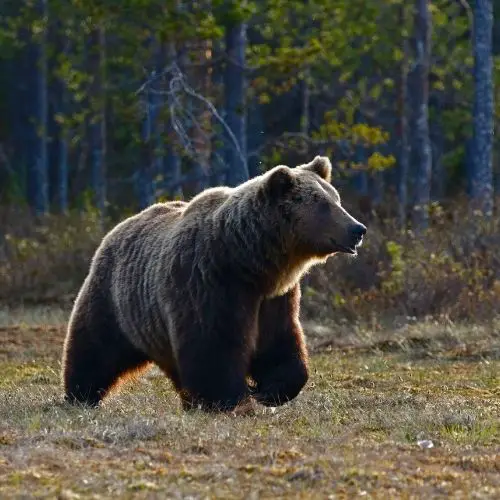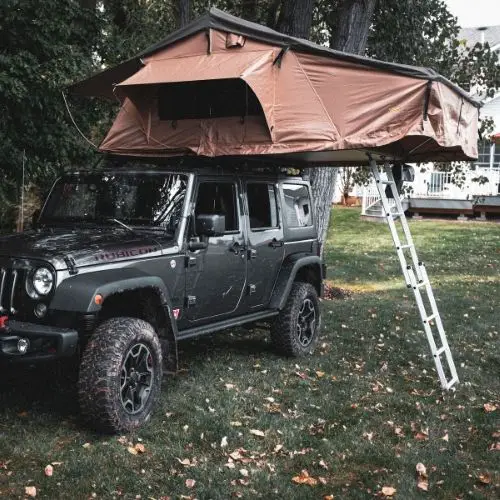We may get commissions for purchases made through links in this post. Thanks for the support! 👍
The sight of a bear around your campsite is the most frightening experience you can ever have while enjoying your picnic.
However, to minimize the adventure of the scary animal to your campsite, most campers have opted for a rooftop tent. Rooftop tents are a safer option to keep you and your group safe from the bears, as the bears aren’t comfortable with climbing to higher heights.
Reasons why the rooftop tents are safe from bears

The tents you erect on top of the cars you use for your picnic will provide much more safety from bears than those you set on the ground. Below are some of the important reasons why rooftop tents are safe from bears.
They provide distance between you and the animals
These rooftop tents are a safer option to keep you from the bears as they provide a huge distance between you and the ground where these animals live. Most times bears come to your camp tents as uninvited guests walking around.
More so, factors like leaving food outside unattended too will be one of the reasons that may invite bears to your camp tents.
Bears find it hard to climb up trees or objects.
Older bears, which are usually scarier animals, always find it hard to climb up the trees. Setting the rooftop tent will limit the access of the scary animal to your camping site tent. Only the little cubs love climbing the trees; however, they may not bring more discomfort than the adult bears.
Precautions to take while on rooftops tent to stay safe from the bears
Being on a rooftop tent is the most safer option from bears while camping. Nonetheless, there are certain precautions you’ll need to take to ensure that you’re more secure. Below are some of the considerations to guarantee your safety from the bears:
I. The distance between the ground and your rooftop tent.
While standing on their hind legs, the bears can have a height of about 8-feet. However, the polar can stand up to a height of 11 feet. Therefore, you should ensure you elevate your tent above this height to prevent the bears from accessing your tents while on their hinds. This height will also depend on the type of car and the style of tent you have.
II. Closeness to trees
Especially the younger bears are avid climbers; thus, they’re comfortable climbing trees. However, for the oldest bears, it becomes a challenging task to climb trees or higher heights. Therefore, while constructing your rooftop tent, it’d be great if you choose a location free from any surrounding trees.
The reason being, the cubs, will climb the tree, accessing your rooftops tent. You’ll face the wrath of the mother when getting the little cubs from your tent. Therefore, it’ll be great to avoid setting your rooftop tents closer to the trees.
III. Things you’ve left outside the tent or car

While seeking safety from bears by having a rooftop tent, you shouldn’t forget the basic rule of keeping the bears away. After setting your rooftop tents, ensure that all the food or anything that can tempt the bear you’ve sealed and stored correctly. Leaving the food on the ground may attract the bears, later climbing onto your car rooftop tents.
It’ll also be good to store the foods in a concealed container or cooler, which you should place inside your car. Alternatively, you can have the cooler with you in the tent. Leaving the food unattended on the ground will tempt the bear to your tent.
- Are rooftop tents bad for your car?
- 7 Reasons why Roof Top Tents so Popular
- Roof Top Tents: Are They Waterproof?
What’s the best type of rooftop tent to keep you safe from bears?
The best rooftop tent to keep you safe from bears is the hard shell rooftop tent. This type of rooftop tent provides the best shield against wild animals and other external threats. It has a more rigid and more robust shell that prevents the bears from getting into the tent. However, when choosing the hard shell rooftop tent, you consider the material you have and the type of car you’re using at the camping site.
Conclusion
Bears may present a nuisance and real danger to your camping experience. However, raising your campsite tent off the ground and away from the animal’s mouth and nose would be a more excellent step for keeping you safe from the scary animal. Ensure you observe the distance from the ground, the proximity to trees, and the foods you leave unattended beside your tent or car while setting it up.

![TOP 8 Best Bull Bars For RAM 1500 [And Others]](https://amanandhisgear.com/wp-content/uploads/2020/05/2013-RAm-1500-Bull-Bar-1.jpg)
![Can Camping Chairs Get Wet? [6 Examples]](https://amanandhisgear.com/wp-content/uploads/2020/10/Can-camping-chairs-get-wet_.jpg)
